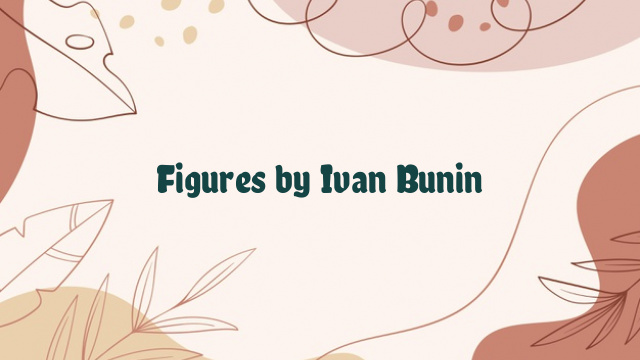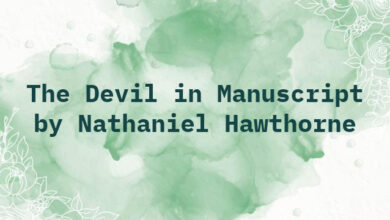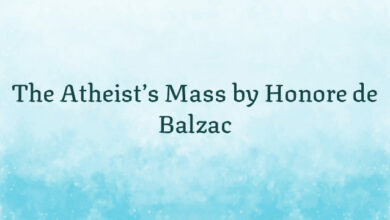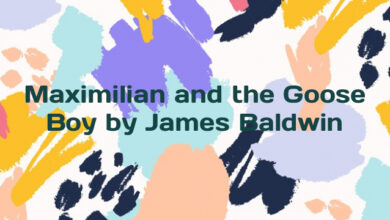
Figures by Ivan Bunin
Figures was translated and published in The Russian Review in June, 1916.
I.
My dear boy, when you grow up will you remember how, one winter evening, you came into the dining room, stopped on the threshold, for it was after one of our quarrels, and lowered your eyes with such a sad expression on your face?
I must tell you that you were dreadfully mischievous at that age. You never knew when to stop once you became excited over something. Sometimes you would give us no rest with your incessant running about the house. And yet I know of nothing that would be more touching than the sight of you, when, weary with your racing about, you would become quiet, walk around a little, and then come to me and put your little head against my shoulder, an expression of complete loneliness on your facet And if it happened to be right after a quarrel, did I say but one caressing word to you, what didn’t you do with my heart? How you threw yourself on my neck, how you kissed me, full of that absolute loyalty, of that passionate tenderness, of which only children are capable!
But this time it was too great a quarrel.
Do you remember that on that evening you did not even approach me?
“Good night, uncle,” you said quietly, and made a very ceremonious bow.
Of course, after all your misdeeds you wished to appear particularly well-bred and polite. Your old nurse had taught you that ceremonious bow as the only sign of politeness and good manners known to her. And, in order to regain my goodwill, you decided to use good manners as your last resort. And I understood all this, and hastened to reply as if nothing had happened between us, though rather reservedly,
“Good night.”
But could you be satisfied with a peace like this? And you were too young then to be a hypocrite. Having suffered through your sorrow, your heart again turned passionately to the dream that had been fascinating you all day. And in the evening, when the dream again overpowered you, you forgot completely your former resentment, and your self-love, and your firm decision to hate me all your life. You were silent for a moment, then, suddenly, you began to speak hurriedly and excitedly.
“Uncle, please forgive me. . .I’ll never do it again. . .And please show me the figures, after all! Please!”
Could anyone be slow in responding to such an appeal? Yet, I delayed my response. You can see what a wise uncle I am.
II.
That morning you awoke with a new thought, a new dream, that overmastered your whole soul.
You were suddenly filled with an ambition to taste of pleasures heretofore unknown: to own your own books with pictures, your own pen-case, your own colored pencils—there was no question about their being colored—to learn how to read, draw, make figures. All this was to be acquired immediately, that very day. The moment you opened your eyes, you called me into your room and began to beg me to subscribe to a magazine for children, to buy you books, pencils, paper, and to begin immediately to teach you figures.
“But this is a holiday, everything is closed,” said I, knowing perfectly well that I lied, but trying to postpone the matter until the evening or the next day; for I had not the slightest desire of going to the city.
But you began to shake your head.
“It isn’t a holiday, at all!” You almost screamed this, raising your eye-brows. “I know it isn’t a holiday.”
“But I’m telling you it is.”
“And I know that it isn’t. Now, please!”
“If you are going to bother me like this,” said I sternly and firmly, as all uncles say to children on such occasions, “if you are going to bother me, I won’t buy you anything at all.”
You became thoughtful.
“Well,” said you with a sigh, “if it’s a holiday, let it be a holiday. But what about the figures?” This was said in a much calmer tone. “You can show me the figures on a holiday, can’t you?”
“No, he can’t,” said grandma. “A policeman will come and arrest you. Stop bothering your uncle.”
“That isn’t it at all,” said I to grandma. “Only, I don’t want to do it now. I’ll do it to-night, or to-morrow.”
“No, you’ll do it now.”
“I don’t want to do it now. I said to-morrow.”
“Oh, yes, you said to-morrow. And to-morrow you’ll tell me the same thing. No, do it now.”
My heart was whispering to me that I was committing a great sin, for I was depriving you of happiness, of joy. . .But a wise principle came into my head: it is harmful to let children have their own way. And I answered sternly:
“To-morrow. I said to-morrow, and it’s going to be to-morrow.”
“Well, all right uncle,” said you in a threatening tone. “You’ll remember this.”
Then you began to dress rapidly. And as soon as you were dressed, and said the prayers with grandma, and swallowed down a cup of milk, you rushed into the sitting room. A moment later we already heard the rumbling of overturned chairs and your loud shouts. . .
All day we could not get you to quiet down. You hardly ate anything at lunch time, sitting restlessly in your chair, swinging your feet, and regarding me all the time with your strangely shining eyes.
“Will you show it to me?” you asked several times.
“Yes, to-morrow.”
“Fine! Why doesn’t that to-morrow come quickly? Why doesn’t it come?”
But your joy, mingled with impatience, made you more and more excited. And in the afternoon, when your mother, grandma, and I sat down to tea, you found another way of giving vent to your emotions.
III.
You devised an excellent game. You would jump up into the air, then strike the ground with your feet, as hard as you could, and accompany this with a shriek that caused our ear-drums to approach the bursting point.
“Stop it, Eugene,” said your mother.
Instead of replying, you struck the floor harder than ever.
“Stop it, dear, mamma is asking you,” said grandma.
But you are not afraid of your grandma at all. Bing!
“Oh, stop it,” said I, trying to appear calm, and to continue the conversation.
“Stop it yourself,” you shouted, struck the floor again, and shrieked even louder than before.
I shrugged my shoulders and pretended to pay no attention to you. But it is here that the whole thing began.
I said that I pretended not to pay any attention to you. But, shall I tell you the truth? I not only did not forget about you after your insolent shout, but I began to experience a feeling of hatred for you. I had to make an effort to pretend that I did not notice you and to appear calm. But this did not end the matter. You shouted again, shouted so that everything that was going on in your soul at that time must have been in your shout, for it was so full of pure, divine joy, that God himself would have smiled had he heard you. But I jumped up from my chair in fury.
“Stop it!” I bellowed suddenly, myself astonished by the loudness of my tone. What devil was it that poured a whole barrel of fury upon me at that moment? I did not know what I was doing. For an instant your face became distorted with a lightning-like streak of horror.
“Ah!” you shouted again, and, just to show me that you were not afraid, you struck the floor again.
And I, I rushed at you, seized you by the arm so that you turned almost completely around, slapped you with a keen sense of satisfaction, and pushed you out of the room.
There’s figures for you!
IV.
The pain of the blow, the sudden and sharp humiliation that struck your very heart in one of the most joyful moments of your childhood, caused you to set up such a dreadful cry, in such a high-pitched voice, that the best singer in the world would have envied the reach of your register. Then you were silent for a long time. . .But, filling your lungs with more air, you raised your voice to an even higher pitch, and the crying continued.
Gradually, the intervals between your high and your low notes began to decrease, and the cries followed each other in rapid succession. Then you began to call for help and, with a sense of painful pleasure, play the part of the dying.
“O—oh, it hurts! Mamma, I’m dying!”
“Never mind, you won’t die,” said I coldly. “You’ll shout for a while, and then stop all right.”
You still kept it up. Our conversation was broken off, of course. I was beginning to feel ashamed of myself. I lit a cigarette, without lifting my eyes to where grandma was sitting. And suddenly, her lips began to shake, she turned her face towards the window, and began to drum on the table with a teaspoon.
“He’s an awfully spoiled child,” said your mother, trying to appear perfectly fair, and resuming her knitting. “Dreadfully spoiled.”
“Oh, grandma, grandma, dear!” you were crying in the meantime, appealing to your last refuge.
And grandma had the hardest time in the world trying to remain in her chair. Her heart was flying to where you were, but to please your mother and me, she stayed in her place, looking out of the window and drumming on the table with her spoon.
You must have realized that we had decided not to give in, that nobody will come to allay your pain with kisses and to comfort you with love, to beg your forgiveness. Your tears, too, were all wept away already. You were exhausted by your cries, by your childish sorrow with which no human sorrow can perhaps compare, but you were not going to quiet down. It was plain that you derived no more pleasure out of your sobs, that your voice was hoarse, that you had no more tears. Yet you continued to sob and cry.
I could scarcely endure it myself. I wanted so much to get up from my chair, open the door, and, with one kind word, put an end to your suffering. But such an action would not have been consistent with the established rules of rational education, and with the dignity of a stern and just uncle! Finally you became quiet. . .
V.
“And we made our peace immediately?” you ask.
Oh, no. I was firm to the end. It was at least a half-hour after you became quiet that I came to the nursery. But how? I opened the door with a serious face, as if I was looking for something in the room. You were gradually returning to your old life. Sitting on the floor, your whole body still occasionally shaken by deep sighs that usually follow a period of long weeping, your face dark with the tears smeared all over it, you were occupied with your modest toys, several match boxes, which you were arranging in the space between your outstretched legs into patterns known to no one but yourself. How my heart ached at the sight of those boxes!
But, making it quite evident that our relations were broken, that I felt insulted, I scarcely looked at you. I examined the table and the window sills attentively. . .Where was my cigarette-case, anyway?. . .I was just going out, when you raised your head and, looking at me with your eyes full of contempt and hatred, you said hoarsely:
“Now I’ll never, never love you any more.”
Then, after a little thought, you tried to say something else, but could not find what to say and said the first thing that came to your head:
“And I’ll never buy you anything.”
“Don’t have to,” said I indifferently, shrugging my shoulders, “I wouldn’t have accepted anything from a bad boy like you, anyway.”
“And I’ll take away that Japanese penny I gave you,” said you in a high, broken voice, making your last attempt to sting me.
“Now that would be very bad, indeed. To give and then take away again. Still, it’s your business.”
After that your mother and grandma came into the room, pretending to look for something. Then they would shake their heads and begin to talk of the bad boys who grow up without minding their elders, and whom nobody loves because of that. They always ended by advising you to go to me and ask my forgiveness., “Otherwise uncle will be angry and will go away to Moscow.” grandma was saying sadly. “And will never come to see us.”
“Let him stay away,” you answered in a very low voice, lowering your head.
“And I’ll die,” said grandma still more sadly, never realizing what a cruel means she was employing to force you to break your pride.
“All right,” answered you in a whisper.
“Fine, splendid,” said I, feeling another attack of anger. “A fine fellow for you,” repeated I, looking out into the dark street.
And, having waited until the elderly maid, who was always silent and sad because of a realization that she was the widow of a machinist, had lit the lamp, I added:
“A fine child!”
“Don’t pay any attention to him,” said your mother, regulating the lamp-flame. “I wouldn’t speak with him at all.”
And we pretended to have forgotten all about you.
VI.
The lamp in the nursery was not lit, and the windows were dark blue. Outside, a winter evening was coming on fast, and it was dreary in the room. You were still sitting on the floor, moving your match-boxes about. Those boxes of yours haunted me. I arose and decided to go out for a walk. But before I was gone, I heard grandma whisper to you:
“You ought to be ashamed of yourself. Uncle loves you so much and brings you presents and toys.”
“It isn’t that at all,” said I in a loud voice. “The presents have nothing to do with it.”
But grandma knew what she was doing.
“What do you mean they have nothing to do with it? It’s not the presents that count, it’s the spirit.”
And then, after a moment’s silence, she plucked the most sensitive chord of your heart.
“And who is going to buy him pencils now, and a pen-case, and books with pictures? But then, what’s a pen-case? But the figures? You can’t buy them for money. However, you can do as you like.” And she left the nursery.
Your pride was broken. You were conquered. The more inaccessible is a dream, the more fascinating it is—and the more fascinating it is, the more inaccessible it seems. This I know well. The dream holds me in thrall from my early childhood. And I know that the more precious my thought is to me, the less hope there is of its becoming realized. And I am waging a constant struggle with it. I play the hypocrite; I pretend that I am indifferent. But what could you do?
Happiness, happiness!
You were full of longing for happiness when you opened your eyes in the morning. Confiding, like every child, your heart frank and open, you came to Life and said, “Hurry! Hurry!”
“Be patient,” answered Life.
“Please! Please!” you exclaimed passionately.
“Be quiet, or you won’t get anything!”
“Just wait, then,” you cried in fury.
For a time you were silent. Your heart was seething. You overturned chairs, rushed from room to room, struck the floor with your feet, shouted as if pouring your whole thirst for happiness into that shout. . .Then life struck your heart with the dull knife of pain and humiliation. And you began to cry, and shriek, and call for help.
Not a muscle twitched in the face of Life. . .Give in, give in! And you gave in.
VII.
Do you remember how timidly you came out of the nursery, and what you said to me?
“Uncle,” you said, exhausted by your struggle for happiness, and still thirsting for it. “Uncle, forgive me, please.” You begged me for at least a drop of that happiness, the longing for which was bringing you such acute suffering.
But Life is not so easily appeased. It made a sad face and said:
“Of course, the knowledge of figures brings happiness. But you do not love your uncle.”
“It isn’t true, I do love him! I do love him!”
Then Life became kinder.
“Well, bring your chair to the table and get the pencils and some paper.”
With what joy your eyes glistened then! How you rushed about! Fearing that you might anger me, how obedient, how careful were you in every movement that you made! And how eagerly you grasped every word I said!
Taking deep breaths, every little while moistening your pencil with your lips, you bent over the table, laboriously tracing those mysterious lines full of some divine significance. And I watched you, my heart full of pleasure, as I inhaled the odor of your soft hair; for the hair of little children has the odor of little birds.
“One. . .two. . .five” you were saying, tracing the figures.
“No, no. One, two, three, four. . .”
“Oh, yes. Oh, yes,” you would hasten to say. “I’ll start at the beginning. One, two. . .”
And you would look at me in embarrassment.
“Well? Three. . .”
“Oh, yes. Oh, yes. Three! I know.”
And you traced the figure three, and it looked like a large capital E.




